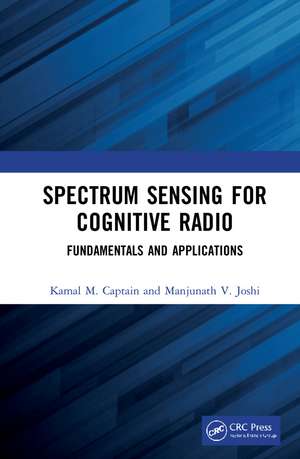Spectrum Sensing for Cognitive Radio : Fundamentals and Applications
Autor Kamal M. Captain, Manjunath V. Joshien Limba Engleză Hardback – 5 ian 2022
The text discusses methodologies for unmixing or decomposing the hyperspectral data into its constituent entities and provides a unified framework for the complete spectral unmixing of the data. It covers important topics including narrowband spectrum sensing, wideband spectrum sensing, cooperative spectrum sensing, system and channel model, detection algorithms, approximation of decision statistics and theoretical analysis of detection algorithms in detail. A separate chapter discusses use of detection algorithm for cooperative wideband spectrum sensing.
Aimed at graduate students and academic researchers in the field of electrical engineering, electronics and communication engineering and remote sensing, this text:
- Discusses concepts of cognitive radio and research in spectrum sensing.
- Presents mathematical analysis of algorithms considering practical environment.
- Explains novel wideband spectrum sensing algorithms with detailed analysis.
- Provides mathematical derivations to help readers.
- Discusses basic spectrum sensing algorithm for narrowband spectrum sensing to the more advanced wideband spectrum sensing.
Preț: 785.30 lei
Preț vechi: 957.67 lei
-18% Nou
150.26€ • 157.45$ • 124.22£
Carte tipărită la comandă
Livrare economică 12-26 aprilie
Specificații
ISBN-10: 0367542935
Pagini: 256
Ilustrații: 78 Line drawings, black and white; 25 Tables, black and white; 78 Illustrations, black and white
Dimensiuni: 156 x 234 x 16 mm
Greutate: 0.54 kg
Ediția:1
Editura: CRC Press
Colecția CRC Press
Public țintă
Postgraduate and ProfessionalCuprins
and Fading. 6. Diversity for Wideband Spectrum Sensing Under Fading. 7. Cooperative Wideband Spectrum Sensing. 8. Conclusions and Future Research Directions. 9. Appendix A Appendix for Chapter 1. 10. Appendix B Appendix for Chapter 4. 11. Appendix C Appendix for Chapter 5. 12. Appendix D Appendix for Chapter 6. 13. Appendix E Some Special Functions. 14. References.
Notă biografică
Dr. Kamal M. Captain received his Ph.D. in the area of Spectrum Sensing for Cognitive
Radio from Dhirubhai Ambani Institute of Information and Communication
Technology (DAIICT), Gandhinagar, India. Before this, he completed his M.Tech
in Communication Systems from Sardar Vallabhbhai National Institute of Technology
(SVNIT) and B.E degree in Electronics and Communication Engineering from
Veer Narmad South Gujarat University (VNSGU), Surat, Gujarat, India. He is currently
serving as an assistant professor at Sardar Vallabhbhai National Institute of
Technology (SVNIT), Surat, Gujarat, India. Prior to joining SVNIT, he served as a
senior engineer (signal processing) at eInfochips, Ahmedabad, India. He has been
involved in active research in the areas of cognitive radio, wireless communication,
signal processing, and machine learning and has several journals and international
conference papers, including IEEE Transactions. He has also served as a reviewer
for IEEE Transactions, letters, and top tier conferences.
MANJUNATH V. JOSHI:
Prof. Manjunath V. Joshi received the B.E. degree from the University of Mysore,
Mysore, India, and the M.Tech. and Ph.D. degrees from the Indian Institute of Technology
Bombay (IIT Bombay), Mumbai, India. He is currently serving as a Professor
and and Dean Research and Development with the Dhirubhai Ambani Institute
of Information and Communication Technology, Gandhinagar, India. He has been
involved in active research in the areas of Signal and Image Processing, Cognitive
Radio, Computer Vision, and Machine Learning and has several publications in quality
journals and conferences. He has co-authored four books entitled Motion-Free
Super Resolution (Springer, New York-2005), Digital Heritage Reconstruction using
Super-resolution and Inpainting (Morgan and Claypool-2016), Regularization in Hyperspectral
Unmixing (SPIE Press-2016), and the book entitled Multi-resolution Image
Fusion in Remote Sensing (Cambridge University Press, UK-2019). Currently,
he is contributing as a co-author of a book to be published by Springer in remote
sensing, where seven positive reviews have been received. So far, nine Ph.D. students
have been graduated under his supervision. Dr. Joshi was a recipient of the
Outstanding Researcher Award in Engineering Section by IIT Bombay in 2005 and
the Dr. Vikram Sarabhai Award for 2006-2007 of information technology constituted
by the Government of Gujarat, India. He served as a Program Co-Chair for the 3rd
ACCVWorkshop on E-Heritage, 2014, held in Singapore. He has also served as Visiting
Professor at IIT Gandhinagar and IIIT Vadodara. He has visited Germany, Italy,
France, Hong Kong, the USA, Canada, South Korea, Indonesia and contributed to
research in his area of expertise.
Descriere
This comprehensive reference text discusses concepts of cognitive radio and the advances in the field of spectrum sensing.
The text discusses methodologies for unmixing or decomposing the hyperspectral data into its constituent entities and provides a unified framework for the complete spectral unmixing of the data. It covers important topics including narrowband spectrum sensing, wideband spectrum sensing, cooperative spectrum sensing, system and channel model, detection algorithms, approximation of decision statistics and theoretical analysis of detection algorithms in detail. A separate chapter discusses use of detection algorithm for cooperative wideband spectrum sensing.
Aimed at graduate students and academic researchers in the field of electrical engineering, electronics and communication engineering and remote sensing, this text:
- Discusses concepts of cognitive radio and research in spectrum sensing.
- Presents mathematical analysis of algorithms considering practical environment.
- Explains novel wideband spectrum sensing algorithms with detailed analysis.
- Provides mathematical derivations to help readers.
- Discusses basic spectrum sensing algorithm for narrowband spectrum sensing to the more advanced wideband spectrum sensing.
